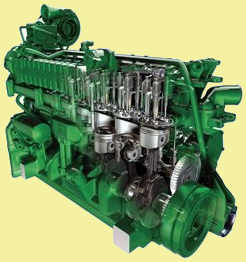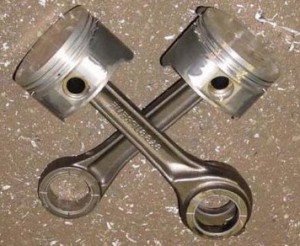Piston – The Life of your Engine
By Shenron on May 06, 2008 with Comments 0
The piston is a part that no internal combustion engine can do without. Most automobiles and mechanical machineries today use internal combustion engines. This type of engine uses burning fuel to facilitate mechanical energy. And the piston is basically the part which makes it possible. In car engines, the importance of the piston and its maintenance is of primary concern. If the engine is the body that pushed your car on the road, then the piston is its heart.
How Pistons Make Your Car Engine Run
Your car engine is an internal combustion engine. Gasoline or diesel is burned inside the engine, transforming chemical energy to mechanical energy. Inside the engine are cylinders. The number of cylinders depends on the type of engine that your car has. Most car engines have four cylinders. Inside these cylinders is where you find the pistons. The pistons move up and down inside these cylinders through fuel combustion. Fuel is injected into the cylinder and then combusted, forcing the piston to go down. The combustion is done at a very fast interval in all cylinders.

The piston is connected to a connecting rod which is then connected to the crankshaft. The crankshaft is designed to convert the up and down motion of the pistons to a rotating motion. The downward movement of one piston will force another piston to go up, thus, continuing the up and down motion of pistons and then producing the rotating movement of the crankshaft.
The piston goes through four cycles namely; intake, compression, ignition and exhaust. During the intake stage, air or a mixture of fuel and air is admitted in to the cylinder. The air goes through the valve which is opened and closed by the camshaft. Compression happens when the piston goes up, compressing the air or air and fuel mixture. Ignition then follows. Ignition is done in two ways. With a diesel engine, ignition is done by injecting fuel to the heated compressed air in the cylinder. While in a gasoline engine, ignition is achieved through a sparkplug. After ignition, the exhaust stage happens. Burned gases are pushed out by the piston that is going up.
Piston Maintenance
Pistons are generally made with the same material that makes up the engine block. The piston is designed to withstand the whole process of combustion when the engine is running. One important substance that ensures engines health is oil. Engine oil lubricates the moving parts of the engine including the piston. Aside from this the cooling system of your engine is also paramount in maintaining the health of your car engine.

The piston rarely gets damaged, but once it is damaged or cracked, nothing could be done but to replace it. The piston does not come in contact with the engine block. Piston rings are fitted on the piston. These rings seal the combustion chamber, lessen the friction of the piston with the wall and regulate the oil in the cylinder. These rings are the ones that are usually damaged because of wear. Once these rings are damaged, the piston comes in contact with the block, thus, increasing heat and friction. Damaged rings also let combusted energy escape, thus, decreasing the efficiency of the engine. It is also the main cause of dark exhaust smoke which comes from oil that gets through the combustion chamber and getting burned.
Filed Under: General